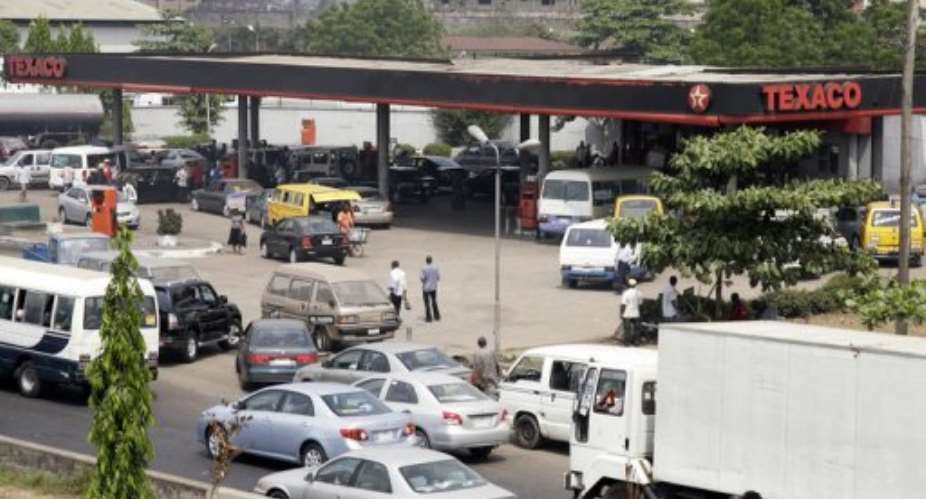ABUJA (AFP) - Nigerian lawmakers called on Tuesday for a probe into an alleged $6.8 billion lost since 2009 through a graft-ridden fuel subsidy programme, an issue that has gripped Africa's most populous nation.
The country's House of Representatives made the call after last week's release of a report by a parliamentary panel alleging massive corruption and mismanagement of the subsidy programme, designed to keep petrol prices low.
At the start of debate on the report, which covers 2009-2011, House Speaker Aminu Tambuwal said anti-corruption authorities should open immediate investigations into those alleged to have been involved in graft.
"We are fighting against entrenched interests whose infectious greed have decimated our people," Tambuwal said during the debate broadcast live on television in Africa's largest oil producer.
"Our only interest here is to mitigate the suffering of Nigeria by showing how the subsidy regime has been hijacked for the benefit of a few."
The House reviewed 35 of the controversial report's 61 recommendations and was to continue the debate on Wednesday. It endorsed all 35 recommendations, though some with amendments.
Despite the controversy generated by the report, the House's endorsement carries no force of law and allegations must be investigated by authorities.
Nigeria imports much of its fuel despite its oil wealth due to a lack of refining capacity, a situation also blamed on corruption and mismanagement.
In order to keep prices low at the pump, the government pays subsidies to fuel importers but the programme has also opened up huge opportunities for corruption.
Nigerians, most of whom live on less than $2 a day, view the subsidies as their only benefit from the nation's oil wealth.
President Goodluck Jonathan, citing corruption among other issues, sought to end subsidies without warning on January 1, causing petrol prices to instantly more than double, resulting in mass protests and a week-long general strike.
He was forced to compromise and partially reinstate the subsidies.
Nigeria's state oil firm, NNPC, has come under intense scrutiny in the parliamentary report, with calls for it and others allegedly involved in improper payments to refund billions of dollars.
The firm has issued a statement criticising the panel that put together the report, saying it was "more interested in maligning and damaging the reputation of the corporation as well as other key players of the industry."
One of ExxonMobil's Nigerian subsidiaries was also named in the report, which alleged it refused to appear before the committee. The report called on the company to refund the government.
Mobil Oil Nigeria's spokesman however denied the allegations and said the firm was never invited, adding it had nothing to hide.
One of the key recommendations from the report endorsed on Tuesday called for an overhaul of NNPC's management and board. Oil Minister Diezani Alison-Madueke, seen as close to the president, is chair of NNPC's board.
It urged that "all those involved in the following infractions be further investigated and prosecuted by the relevant anti-corruption agencies."
The committee's report said Nigeria lost 1.07 trillion naira (5.2 billion euros, $6.8 billion) between 2009 and 2011 through the fuel subsidy programme.
It detailed a list of errors, including lack of accounting, overpayments, willful disregard for regulations and outright incompetence in managing the programme.





 Akufo-Addo spotted ordering chiefs to stand for his handshake
Akufo-Addo spotted ordering chiefs to stand for his handshake
 Akufo-Addo ‘disrespects’ every chief in Ghana except Okyenhene — NDC Communicato...
Akufo-Addo ‘disrespects’ every chief in Ghana except Okyenhene — NDC Communicato...
 Supreme Court clears way for dual citizens to hold key public positions
Supreme Court clears way for dual citizens to hold key public positions
 Be transparent, don’t suppress the truth – Prof. Opoku-Agyemang to Jean Mensa
Be transparent, don’t suppress the truth – Prof. Opoku-Agyemang to Jean Mensa
 ‘I won’t tell the world I was only a driver’s mate during challenges’ – Prof Jan...
‘I won’t tell the world I was only a driver’s mate during challenges’ – Prof Jan...
 We’ll prosecute corrupt officials of Akufo-Addo’s govt – Prof Jane Naana
We’ll prosecute corrupt officials of Akufo-Addo’s govt – Prof Jane Naana
 [Full text] Acceptance speech by Prof Jane Naana Opoku-Agyemang as 2024 NDC Runn...
[Full text] Acceptance speech by Prof Jane Naana Opoku-Agyemang as 2024 NDC Runn...
 Election 2024: Don’t be complacent, we haven’t won yet – Asiedu Nketia cautions ...
Election 2024: Don’t be complacent, we haven’t won yet – Asiedu Nketia cautions ...
 Election 2024: Stop fighting over positions in Mahama’s next govt – Asiedu Nketi...
Election 2024: Stop fighting over positions in Mahama’s next govt – Asiedu Nketi...
 Prof Jane Naana Opoku-Agyemang will restore dignity of vice presidency – Fifi Kw...
Prof Jane Naana Opoku-Agyemang will restore dignity of vice presidency – Fifi Kw...
